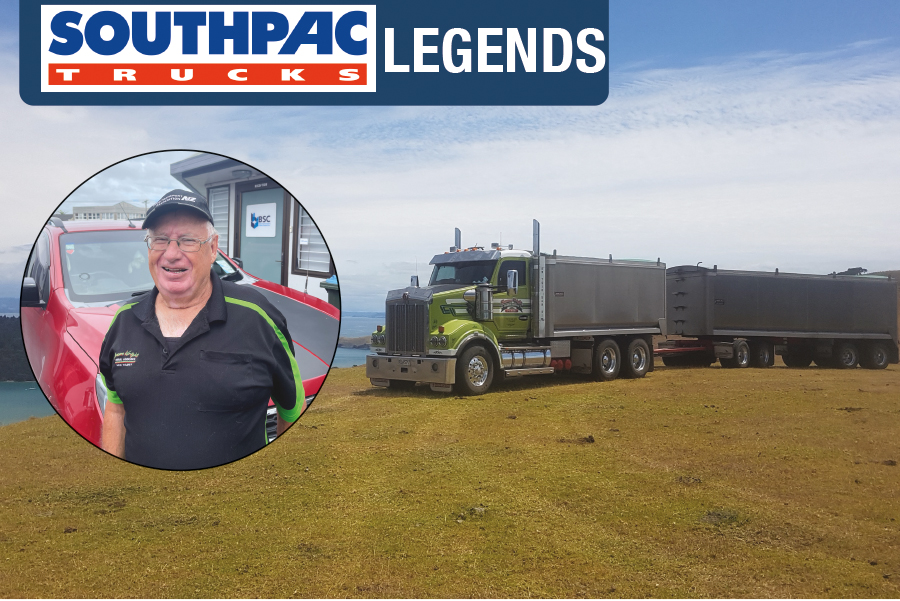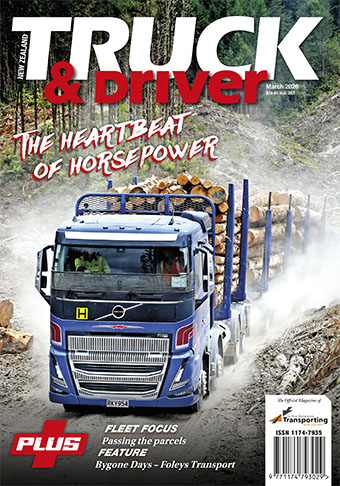Southpac Legends


‘Gunner’ survive and flourish - Graeme Wright Transport Limited
Southpac Legends
Having spent over half a century carting on and around the notorious roads that cover NZ’s Coromandel Peninsula, ‘simply surviving’ is arguably justification enough for being a Southpac Legend. However, when you add to this an earnest desire to inspire young minds, a keenness to expand NZ’s driver network, and a heartfelt love of trucks, the true picture of Puriri based trucker Graeme ‘Gunner’ Wright of Graeme Wright Transport Limited, really begins to emerge.
Graeme says that it was his father that gave him the ‘Gunner’ nickname due to the fact that he was always ‘gonna do this and gonna do that’, and although he says that it was a moniker that he found initially troublesome (kids used to tease him with it at school), it’s a name that stuck. However, bearing in mind what Graeme has achieved, ‘Gunner’ should be changed to ‘Did’ - but that probably doesn’t have the same ring to it.
In fairness to say that Gunner’s school life wasn’t one he looks back at fondly, as not only was he teased for his nickname, but his thick glasses which made him quite the target of ridicule. ‘Why do kids have to pick on kids with glasses?’ he asks.
Needless to say, the moment school was in his rear-view mirror Gunner headed out to work, and that meant truck driving.
...Having spent over half a century carting on and around the notorious roads that cover NZ’s Coromandel Peninsula, ‘simply surviving’ is arguably justification enough for being a Southpac Legend. However, when you add to this an earnest desire to inspire young minds, a keenness to expand NZ’s driver network, and a heartfelt love of trucks, the true picture of Puriri based trucker Graeme ‘Gunner’ Wright of Graeme Wright Transport Limited, really begins to emerge.
Graeme says that it was his father that gave him the ‘Gunner’ nickname due to the fact that he was always ‘gonna do this and gonna do that’, and although he says that it was a moniker that he found initially troublesome (kids used to tease him with it at school), it’s a name that stuck. However, bearing in mind what Graeme has achieved, ‘Gunner’ should be changed to ‘Did’ - but that probably doesn’t have the same ring to it.
In fairness to say that Gunner’s school life wasn’t one he looks back at fondly, as not only was he teased for his nickname, but his thick glasses which made him quite the target of ridicule. ‘Why do kids have to pick on kids with glasses?’ he asks.
Needless to say, the moment school was in his rear-view mirror Gunner headed out to work, and that meant truck driving.
“I was always going to be a truck driver,” he says, “my father was a truckie but was never really into it, but my uncle [Bernie Wright] had Puriri Transport (located between Thames and Paeroa), and I was fortunate enough to get the break to drive there, that was straight out of school.”
Gunner worked at Puriri for a while and in many ways, it cemented his love of the job.
“Our day’s work would start at 5 or 6 in the morning. We’d go down and cart cheese from the dairy factory and then cart chooks back. Then later on the train would come in and we’d go and shovel 40 to 50 tonnes of coal out of the railway wagon and take that down to the factory. We loved it, we always laughed and joked.”
From there, Gunner’s aspirations of running his own business grew and that meant that the appeal of a necessary greater wage packet had him crossing the ditch to Aus.
“I went to Australia not long after I was 18 and worked for Mount Tom Price, an iron ore mine in West Australia. And then I went up to Dampier Salt where they were making the salt levies. [After 18 months] I made enough to come home and buy the cream run from Thames to the dairy, which included an old 1960 Commer diesel truck.”
Gunner started doing the run in 1969 but says that the run itself wasn’t his primary focus, he wanted the truck and for that he had to have a Vehicle Authority licence.
“When I started you had to have vehicle authorities, you had to have one for your truck and one for your trailer. They were hard to come by so it was a lot better to buy one with a little bit of business,” he says, adding that as soon as he could he took a step up to a D-series Ford
Gunner says that he ran the cream run until the tankers took over and during that time, not only was he given the Thames to Paeroa run for NZ Dairy, but he also started up a freight run too, often pushing (and exceeding) the 40-mile boundary limit.
“I had a go at carting everything. In those days I had a Ford D1000, and I pulled two 2-axle trailers. I’d slide the bolsters on the deck and do the logs, then slide them off and cart metal.”
“For me the two trailers really worked well, because I’d come up to the fertiliser works and sleep in the Ford and be first in the queue, so I could do two loads of fert into the Coromandel. I’d drop the centre trailer to a farmer with 12-tonne of fert on it and he’d shovel it off while I’d take my back 2-axle Walker trailer and cart metal over Tapu hill.”
As work grew so did Gunner’s horsepower. He bought an old ERF logging truck with a 250 Cummins, preferring the bigger 250 horsepower over the Ford’s.
“With that Ford, I’d go out from Thames, and I’d still have my foot flat by Waitakaruru and still not be up to speed. but you get that 250 Cummins and it’s up cruising by the first corner.”
“I’ve always liked horsepower. If the drivers can’t handle it, I don’t think you should have them. He’s going to do as much damage with 400hp as he is with 700hp.”
The cream run ran for around 5 years (1975), and by the time it ended, Gunner had already built up his carting business to a point where he needed a second driver.
“Second driver, second truck. I couldn’t do everything,” he says, “it’s the same in the Coromandel area now, I’ve got 22 trucks and only about 12 permanent drivers. But I’ve got about 20 staff with mechanics and dispatchers and part time drivers. I can drive and so can the dispatchers.”
Gunner’s keenness to increase horsepower was matched by his desire to own a Mack and as soon as he got enough money and paid off enough of a truck, he’d go a step higher. But it wasn’t until 1983 when he got enough money to buy a brand-new FR Mack 8-wheeler.
The brand new 1983 Mack was my ambition, you maybe went for the prettiest girl, my ambition was the Mack,” he jokes.
With things going well on the ground, Gunner set his sights on the sky, and he co-owned an aeroplane.
“Thames aerial top dressing. That was 1991,” he says, “Three of us (Paul Miller and Keith Hale) bought a 300 Fletcher.”
Over time both Paul and Keith dropped out and Gunner took it on his own, eventually selling out to Super Air.
Gunner’s working life hasn’t been without dramas and setbacks either, issues with drivers and employees including a trailer rolling on the road out of Port Jackson where a number of sheep were lost.
“So, when my dispatcher calls me and says, ‘you don’t want to hear this’, it always ends with things like ‘a truck has broken down or got stuck’. I don’t go to church, but I believe, and I believe he looks after me,” he exclaims and looks skyward.
The business has had its fair share of financial woes along the way and Gunner reckons that he’s nearly gone broke several times.
“But my father always taught me, a rolling stone gathers no moss, so whatever happens stick with it. And I have stuck with it. Plenty of times I’ve thought I was finished, but I got up and went again. The major thing I’ve got in my business is that 99% of my work is farmers and you won’t get anyone more loyal to you than a farmer. They’re like family to me.”
“But our work is so seasonal, and it’s got real hard now. With fuel being the way it is, our fuel bill has doubled. They say if you’re paying GST, you’re in profit but I tell people I pay every bill every month, I owe the least money I have ever owed but I’ve got the least money I’ve ever had.”
Gunner is quick to point out the good parts too, saying that ‘surviving the coromandel roads’ has been a challenge that he’s enjoyed.
“I could name you twenty carriers that have been and gone in the Coromandel, but I loved it. I loved getting up in the early hours of the morning. In the past, when two of us have done an early morning run, I slept in but still caught him before Wilson’s Bay.”
“I know the roads. I’ve got rules. I say to my drivers that there’ll never be an accident on any corner if you can stop, so always treat every corner like something’s coming around it - and touch wood, I don’t think we’ve had a serious accident there.”
Gunner is always keen to get new drivers behind the wheel (including offering up ‘a small 4-wheeler plus a trailer to help anyone get a licence’) and supports the industry with the likes of driving competitions when he can. He’s also been invited along to his local school to inspire the kids.
“I felt that I had a shitty life as a kid, with big thick glasses I was the biggest joke out there. Just because you had glasses as a kid you copped it. People back then didn’t call it bullying, they called it teasing. They laughed at people’s misfortunes. I wanted to go back and tell those kids ‘never think you’re not as good as anyone else, because you are.”
He was also approached by Orongo Model Barn owner Jeremy Welsh who asked if they could do a limited (500 run) replica model of his 750 Volvo, Gunner was rapt.
“I said that’s a bloody privilege, it’ll be a great way to finish my years when I love trucks.”
Gunner jokes that the biggest thing he puts down to his ‘surviving’ is that he’s pretty good at grovelling, saying that like many other people, ‘If you want to do a good deal, you [often] can’t say what you really think.’
But this successful ‘gunner’ has evidently done much more than just survive and he’s quick to thank the ‘loyal’ farmers for his success, adding that there’s been a lot of people in the industry that have helped him along the way too, too many to mention in fact.
“I’m 76 now and last January I got my heavy goods licence until I’m 80, and they won’t want me on the road after that probably anyway. But I’ve loved what I’ve done, and I still love the trucks, there’s not many trucks that go past my house that I don’t look out to see.”
“It’s still good because I still love it. And if you can do that it’s pretty neat.”
Pretty neat indeed.



 + EQUIPMENT GUIDE - FREE
+ EQUIPMENT GUIDE - FREE
